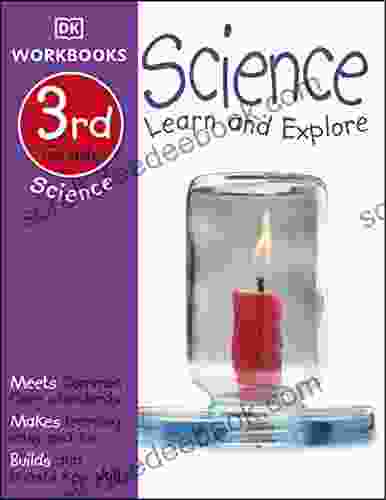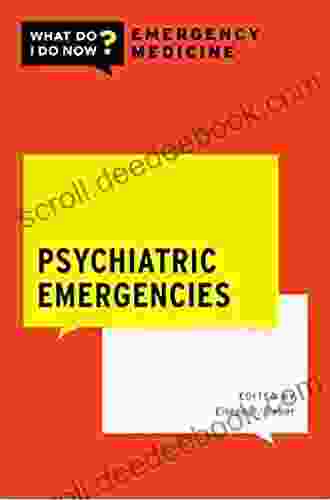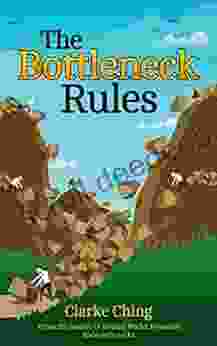Psychiatric Emergencies: What to Do in the Emergency Room

A psychiatric emergency is a situation in which a person is experiencing severe mental distress and requires immediate medical attention. This can include thoughts of suicide or homicide, hallucinations, delusions, or other symptoms that interfere with the person's ability to function.
If you are experiencing a psychiatric emergency, it is important to seek help immediately. You can go to the nearest emergency room or call 911. The emergency room staff will be able to assess your symptoms and provide you with the necessary care.
5 out of 5
| Language | : | English |
| File size | : | 3630 KB |
| Text-to-Speech | : | Enabled |
| Screen Reader | : | Supported |
| Enhanced typesetting | : | Enabled |
| Print length | : | 232 pages |
| Lending | : | Enabled |
When you arrive at the emergency room, you will be assessed by a triage nurse. The triage nurse will ask you about your symptoms and medical history. They will also perform a physical examination to rule out any medical conditions that may be causing your symptoms.
After the triage nurse has assessed you, you will be seen by a psychiatrist or other mental health professional. The psychiatrist will ask you about your symptoms, thoughts, and feelings. They will also perform a mental status examination to assess your orientation, memory, and judgment.
Based on your assessment, the psychiatrist will develop a treatment plan. This may include medication, therapy, or a combination of both. The psychiatrist will also make recommendations for follow-up care.
If you are experiencing a psychiatric emergency, it is important to seek help immediately. The emergency room staff will be able to assess your symptoms and provide you with the necessary care.
What are the signs and symptoms of a psychiatric emergency?
The signs and symptoms of a psychiatric emergency can vary depending on the individual. However, some common signs and symptoms include:
- Thoughts of suicide or homicide
- Hallucinations
- Delusions
- Other symptoms that interfere with the person's ability to function
If you are experiencing any of these symptoms, it is important to seek help immediately.
What should I do if I am experiencing a psychiatric emergency?
If you are experiencing a psychiatric emergency, you should go to the nearest emergency room or call 911. The emergency room staff will be able to assess your symptoms and provide you with the necessary care.
When you arrive at the emergency room, you will be assessed by a triage nurse. The triage nurse will ask you about your symptoms and medical history. They will also perform a physical examination to rule out any medical conditions that may be causing your symptoms.
After the triage nurse has assessed you, you will be seen by a psychiatrist or other mental health professional. The psychiatrist will ask you about your symptoms, thoughts, and feelings. They will also perform a mental status examination to assess your orientation, memory, and judgment.
Based on your assessment, the psychiatrist will develop a treatment plan. This may include medication, therapy, or a combination of both. The psychiatrist will also make recommendations for follow-up care.
What are the different types of psychiatric emergencies?
There are many different types of psychiatric emergencies. Some of the most common include:
- Suicide attempts
- Homicidal threats
- Hallucinations
- Delusions
- Mania
- Depression
- Anxiety
- Substance abuse
If you are experiencing any of these symptoms, it is important to seek help immediately.
How are psychiatric emergencies treated?
The treatment for a psychiatric emergency will vary depending on the individual and the type of emergency they are experiencing. However, some common treatments include:
- Medication
- Therapy
- Hospitalization
Medication can be used to treat a variety of psychiatric symptoms, such as depression, anxiety, and psychosis. Therapy can help individuals to learn how to cope with their symptoms and develop healthier coping mechanisms. Hospitalization may be necessary for individuals who are at risk of harming themselves or others.
What is the prognosis for psychiatric emergencies?
The prognosis for psychiatric emergencies can vary depending on the individual and the type of emergency they are experiencing. However, with proper treatment, most individuals can recover from a psychiatric emergency and go on to live full and productive lives.
How can I prevent psychiatric emergencies?
There is no surefire way to prevent psychiatric emergencies. However, there are some things you can do to reduce your risk, such as:
- Getting regular exercise
- Eating a healthy diet
- Getting enough sleep
- Avoiding alcohol and drugs
- Managing stress
- Seeking help from a therapist or counselor if you are struggling with mental health issues
If you are experiencing any of the symptoms of a psychiatric emergency, it is important to seek help immediately. The sooner you get help, the better your chances of recovery.
5 out of 5
| Language | : | English |
| File size | : | 3630 KB |
| Text-to-Speech | : | Enabled |
| Screen Reader | : | Supported |
| Enhanced typesetting | : | Enabled |
| Print length | : | 232 pages |
| Lending | : | Enabled |
Do you want to contribute by writing guest posts on this blog?
Please contact us and send us a resume of previous articles that you have written.
 Novel
Novel Page
Page Chapter
Chapter Text
Text Genre
Genre Reader
Reader Paperback
Paperback E-book
E-book Magazine
Magazine Newspaper
Newspaper Glossary
Glossary Bibliography
Bibliography Foreword
Foreword Manuscript
Manuscript Codex
Codex Bestseller
Bestseller Library card
Library card Narrative
Narrative Autobiography
Autobiography Memoir
Memoir Encyclopedia
Encyclopedia Dictionary
Dictionary Thesaurus
Thesaurus Character
Character Catalog
Catalog Card Catalog
Card Catalog Borrowing
Borrowing Periodicals
Periodicals Research
Research Reserve
Reserve Journals
Journals Reading Room
Reading Room Special Collections
Special Collections Interlibrary
Interlibrary Literacy
Literacy Storytelling
Storytelling Reading List
Reading List Book Club
Book Club Theory
Theory Textbooks
Textbooks Janet Asimov
Janet Asimov Jack Smith
Jack Smith Mollie Schmidt
Mollie Schmidt Amanda Johnston
Amanda Johnston Mark Kernion
Mark Kernion Kathy Reichs
Kathy Reichs Rusty Humphries
Rusty Humphries Ralph Nader
Ralph Nader Louisa Heaton
Louisa Heaton Donna P Hope
Donna P Hope Donatella Mutolo
Donatella Mutolo Shadi Hamid
Shadi Hamid Kofi O Okyere
Kofi O Okyere Frank Smyth
Frank Smyth Jack Gillon
Jack Gillon Rune Hunt
Rune Hunt Christian Goeschel
Christian Goeschel Natasha Lopez
Natasha Lopez Nora Wall
Nora Wall Trisha David
Trisha David
Light bulbAdvertise smarter! Our strategic ad space ensures maximum exposure. Reserve your spot today!

 Peter CarterLearn Enough to Confidently Purchase the Perfect Drum: An In-Depth Guide for...
Peter CarterLearn Enough to Confidently Purchase the Perfect Drum: An In-Depth Guide for... Devin RossFollow ·18.9k
Devin RossFollow ·18.9k Graham BlairFollow ·19.2k
Graham BlairFollow ·19.2k Julio CortázarFollow ·7.3k
Julio CortázarFollow ·7.3k Jaylen MitchellFollow ·19.4k
Jaylen MitchellFollow ·19.4k Hunter MitchellFollow ·7.9k
Hunter MitchellFollow ·7.9k Simon MitchellFollow ·10.3k
Simon MitchellFollow ·10.3k Felix CarterFollow ·8.8k
Felix CarterFollow ·8.8k Thomas HardyFollow ·12k
Thomas HardyFollow ·12k

 Howard Powell
Howard PowellDk Workbooks Science Third Grade: An In-Depth Exploration...
Science education plays a...

 Everett Bell
Everett BellLearn to Play Bluegrass Dobro Guitar: A Comprehensive...
: Bluegrass Dobro, A Story of...

 Jeffrey Cox
Jeffrey CoxHow the Raccoon Got His Mask
The raccoon, with its...

 George Bell
George BellHannah Meets Ruby Hannah Out West: An Adventure-Filled...
Hannah Meets...
5 out of 5
| Language | : | English |
| File size | : | 3630 KB |
| Text-to-Speech | : | Enabled |
| Screen Reader | : | Supported |
| Enhanced typesetting | : | Enabled |
| Print length | : | 232 pages |
| Lending | : | Enabled |














